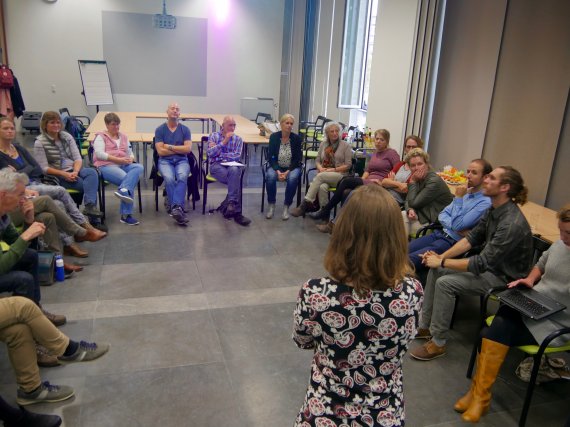© Spread the WURd
The use of digital resources, such as e-learning modules and videos, is steadily growing in popularity in Wageningen education due to the constant increase in student numbers. Manually checking exams and intensive personal contact are just two of the many aspects that are becoming increasingly difficult to achieve, say the attending lecturers, course coordinators and education experts.
Julia Diederen, who works in the laboratory of the Food Chemistry group, started the discussion with an explanation. During her PhD research, she already developed digital educational materials seventeen years ago. ‘Digital education has many advantages’, Diederen says. ‘It is flexible, reusable, always available, consistent and it offers students the choice and control of what and when they want to learn.’
Triggering
Diederen thinks e-learning is necessary. ‘Students expect it, especially the students of the future. Children who are now in primary school are raised surrounded by digital resources.’ This statement turns out to be quite triggering. Many of the attendees fear that digitisation is used as a goal in itself. ‘The question should be: “what are the possibilities of digital learning materials and when can and should we use them?”’, said one of the lecturers present. ‘We should consider what the pros and cons of digitisation are for each course.’
Not all parts of education are equally suitable for the use of digital resources. Diederen happily uses Labbuddy to make her lab work more efficient and effective. ‘If we didn’t have these tools, I wouldn’t have been able to teach all of my 230 students. And I’m convinced that my course has improved because of it.’ But personal contact is essential when checking and discussing lab reports.
Critical stance
‘Couldn’t we, as lecturers, create a list of educational activities that we think should not or cannot be digitised’, suggests one of the lecturers. ‘Aspects like thesis rings, peer reviews, seeing how students deal with feedback – those cannot be digitised.’ This also goes for the higher cognitive skills, such as analysing, taking a critical stance, self-reflecting – skills that are polished during a master’s; the lecturers agree that these cannot be digitised either. Diederen calls this tacit knowledge. ‘Is that something we should want in the first place’, asks one of the lecturers. ‘I enjoy my position as lecturer because of the personal contact, seeing how the students develop. If that would be digitised, it would take away my pleasure in the job as well.’
Arnold Bregt, Dean of Education, will be presented with a report of the first Teachers’ Lounge Café. The lecturers would appreciate support from the university in the use of digital resources. ‘If digitisation is a priority area for the university, we should make sure every lecturer knows what the possibilities are, and provide them with the means and space to start working on it.’

